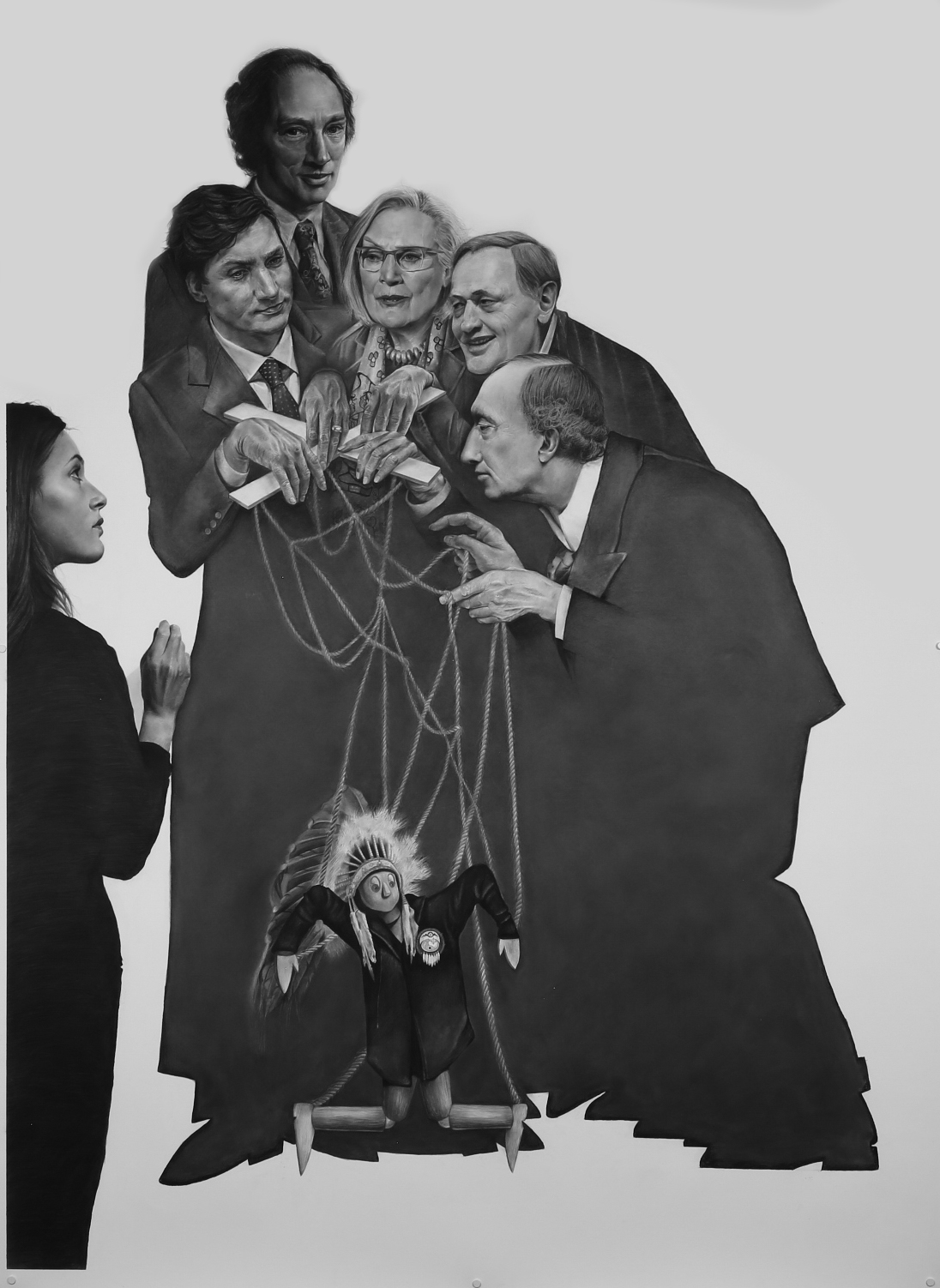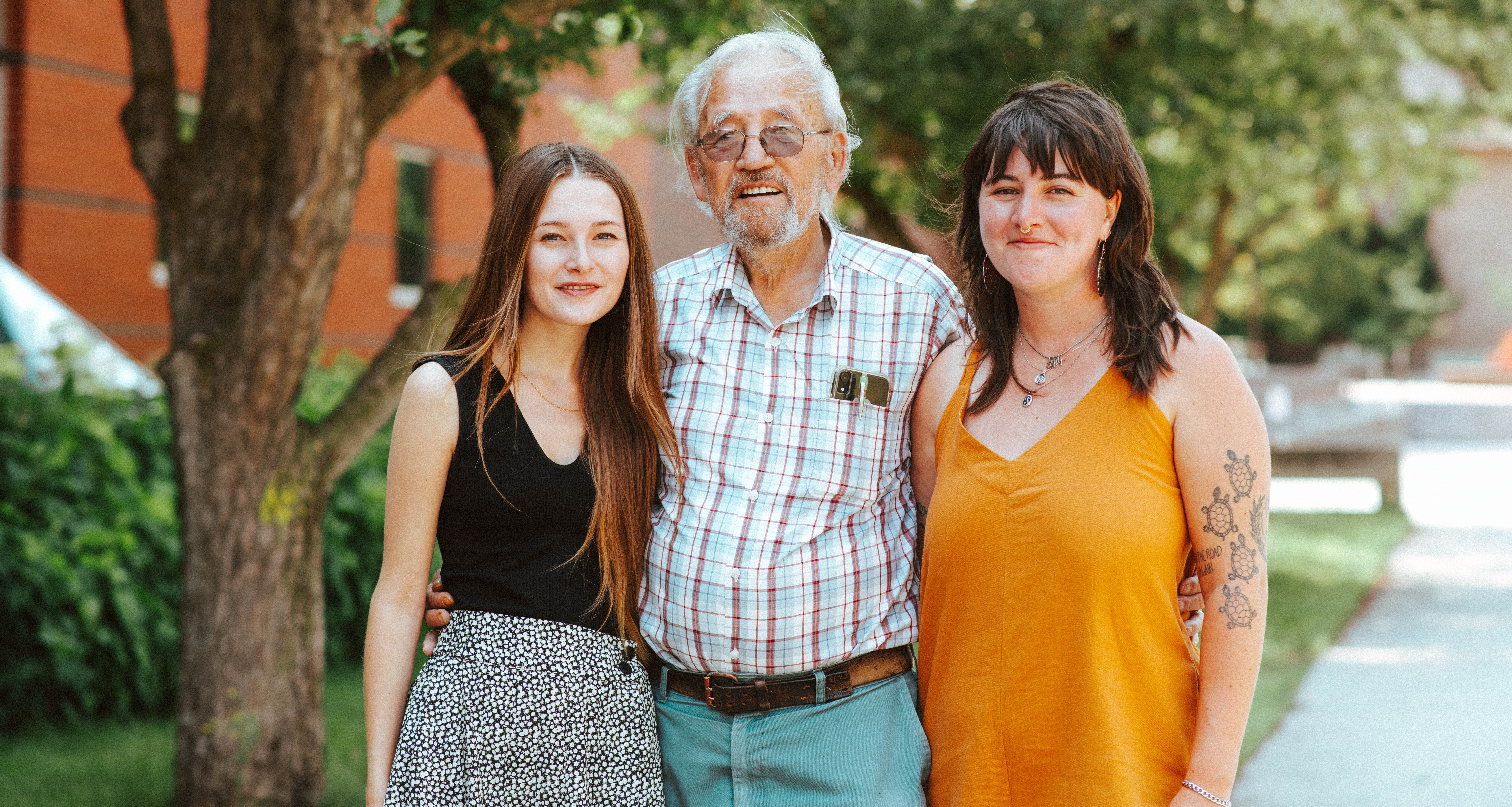Indigenous Learning Professor Dennis McPherson is always willing to take on tough challenges, especially if it makes First Nations communities stronger. That's why after 35 years of teaching at Lakehead, he started a Doctor of Law degree at Queen's University in September.
"Education is an investment," he says, "and once you have it, nobody can take it away from you. My wife Tracy and I, who's also a Lakehead professor, have been telling our daughters that since they were little."
His daughters have taken their advice to heart—Mary is commencing a Doctor of Law at Queen's along with her father, while Sarah is starting a PhD in Communication and Culture at the Toronto Metropolitan University. The three of them also hold multiple degrees from Lakehead.
"Getting our doctorates at the same time is a unique situation," Dennis says, "particularly since we're all status Indians."
He has maintained his fervent belief in education, even though the education system has often failed him. As a child, Dennis and his siblings attended St. Margaret's School on the Couchiching Reserve in Northern Ontario. It was a residential school that, like all of these institutions, had the aim of "killing the Indian in the child in order to save the man."
After one of his brothers was whipped by a teacher, Dennis's parents moved their children to a school in nearby Fort Frances, but this didn't spare them from racist treatment. In high school, Dennis remembers a career counsellor telling him, "Why am I bothering with you, you're just an Indian," prompting him to quit school.
Dennis had many jobs after that, including as a Native child protection worker in Couchiching in the hopes that he could curb the staggering number of Indigenous children being placed in foster care. When his employers thought Dennis was causing too many waves, they removed him from his job. This, it turned out, would be the start of a new chapter in his life.
"I went to Lakehead and walked into Philosophy Professor Dr. J. Douglas Rabb's office and asked if I could take a Native philosophy course. He told me that no such thing existed, so together we created the first Native philosophy course in Canada."
Dennis went on to complete degrees in philosophy and social work and played an instrumental role in founding Lakehead's Department of Indigenous Learning. He also started the first Master of Native Philosophy program in Canada. As an educator, Dennis provides insight into issues Indigenous communities are facing, and he's convinced that education is the key to overcoming entrenched problems like racism.
"Because Indians aren't in charge of their own education system, the average education level of people on reserves is about grade six—this is something that must change."
In the 1990s, Dennis completed Bachelor of Law and Master of Law degrees at the University of Ottawa to enhance his understanding of these issues and "to better comprehend who I am as an Indigenous person."
His PhD studies will continue this exploration.
"For the sake of both Native and non-Native people, we need to truthfully address Canada's history and the damage caused by the actions of the colonial and, later, the federal government."
His PhD dissertation will delve into this history, which he intends to develop into a university textbook.

The McPhersons are united in their efforts to end discrimination against Indigenous Peoples, which comes in many forms. "According to Canada's Indian Act, for instance, an Indian isn't allowed to own anything, and we don't have the legal ability to sign a contract," Dennis says. "If we make a will, it has to be approved by the Minister of Indian Affairs."
Mary and Sarah have been inspired by their father's example and are now activists in their own right. In high school, Mary was already using her art to agitate for change.
"Before the Truth and Reconciliation Commission released its 2015 report about the Indian residential school system," Mary says, "discussions about this topic weren't as welcome, so I used my art to start conversations."
When Mary was still a 4th-year visual arts student at Lakehead, her artistic talent was recognized by the Royal Canadian Mint—they chose her design of Chief Tecumseh, the 19th-century Shawnee warrior, to display on a 2018 commemorative silver coin. Two years later, she created an image of the Battle of the Scheldt for a $20 silver coin.
"I based the soldier on the coin on an uncle of mine who was killed in action in World War Two. Ironically, he used the Ojibway language to send coded radio communications to allies—a language the Canadian government had banned him from using."
After getting her visual arts degree, Mary earned a law degree from the University of Ottawa to assist with the complex legal subjects she was examining in her art.
"I was trying to decipher land claims, government agreements, and the impact of the Indian Act."
Her Doctor of Law will focus on Indigenous people's connection to Canada's constitutional order.
"There's a lot of talk now about transitioning away from the Indian Act, but there's a risk of Indigenous people being treated as municipalities rather than as nations."
Once she's finished her PhD, Mary wants to use her knowledge to initiate community-based change, work that she plans to combine with her art.
Her younger sister Sarah is an equally talented artist who has chosen experimental photography as her medium.
"I started with digital photography, but I fell in love with film photography when my dad gave me his old Pentax camera," Sarah says.
She often uses a 'film soup' technique—soaking film in organic matter, or bleach, and burning away some of the emulsions because it is "a useful way to tell stories. It was extremely helpful when I was doing my undergraduate and master's degrees in English at Lakehead," Sarah says.
For her master's thesis, she interviewed the people of the Couchiching Reserve and took photographs of them—as well as the land and water—before soaking the undeveloped film in the contaminated water of Frog Creek, which runs through the community.
The goal was to explore both the effects of environmental devastation and community members' rootedness in the land. She's decided to get her Communication and Culture PhD because it will give her the freedom to continue her master's work.
"My plan is to teach Couchiching band members to document their own stories and take their own photos, which I will soak using the film soup technique. I want to extend the discussion about their integral relationship with the land."
Dennis, Mary, and Sarah McPherson are excited that they're embarking on the doctoral process together and the chance to share their perspectives with each other.
"It's really important for Indigenous people of any age to see what they're capable of doing," Sarah says. "Even though universities are settler institutions, we can still tell our own stories and learn and succeed in our own ways."


